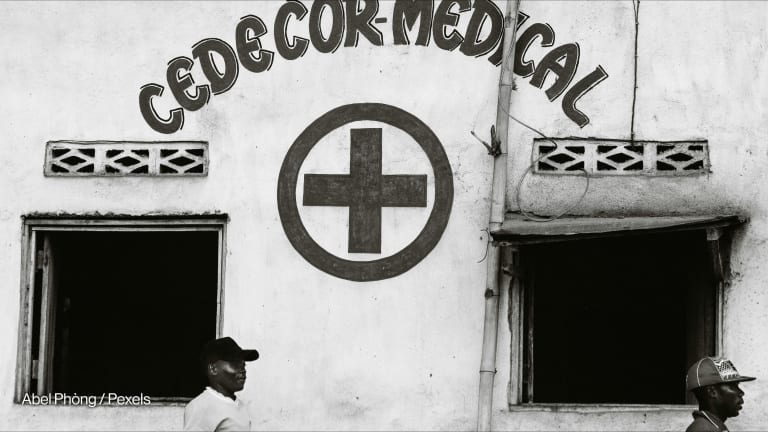
When you think of the big killers in low- and middle-income countries, what springs to mind? HIV, tuberculosis, malaria, Ebola ...? These are the global health challenges that garner political attention and have raised significant funding from institutional and philanthropic donors.
But what if I told you that, globally, cancer now accounts for 8.9 million deaths a year, killing over twice as many people as HIV, TB and malaria combined in LMICs? Survival rates are heartbreakingly low. People often seek treatment too late, and even then, are not necessarily able to access or afford the care they need. I’ve seen people in Sierra Leone treating cancer with paracetamol.
See more on tobacco control:
► Opinion: How tobacco control can boost sustainable development
► What the WTO decision on plain packaging means for developing countries
► Opinion: How incentivizing small tobacco farmers can change livelihoods
There is a perception that cancer only affects people in wealthy countries, that developing countries have more pressing challenges to deal with and that the battle against infectious diseases is not yet won. There is also a misconception that these diseases are linked with indulgent lifestyles and personal choice. And therefore, addressing noncommunicable diseases such as cancer is not palatable to the taxpayer: It raises less sympathy.
The apathy toward NCDs in LMICs is not acceptable, and there is an urgent need for investment in prevention and control. Cancer Research UK, for example, funds life-saving science which has a tangible and positive impact on cancer outcomes. We also see it as a moral and strategic imperative to prevent cancer globally. Not all cancers are preventable, but around 4 in 10 are, and there are clear actions we can take.
Our starting point is tobacco — responsible for 22 percent of cancer deaths globally. We are funding research to support the implementation of the World Health Organization Framework Convention on Tobacco Control, the world’s only public health treaty, which provides tried and tested solutions to curb the tobacco epidemic. LMICs have signed up to the treaty, but implementation has been slow. Global efforts and resources directed to tobacco control have not been proportionate with need: Governments currently spend around $1 billion in total on tobacco control efforts, with only 5 percent of this spent in LMICs.
Rising consumption, cancer, and cost of care
In parallel, tobacco consumption is increasing in LMICs. Bangladesh, a country where 40 percent of adults use some kind of tobacco, provides a good example of why this is the case, as this widespread consumption of tobacco is driven in large part by the low cost of cigarettes. A recent World Bank study showed cigarette prices are among the lowest in the South Asia region — at around $3.40 per pack of 20. And for those who cannot afford that, the locally produced and widely smoked bidis come in at around 41 cents for 20 sticks.
The consequences for the health of Bangladeshis are dire. Tobacco is among the top five drivers of death and disability in the country. The most recent data shows dramatic rises in mortality rates of lung cancer over the past 10 years, as well as increases in deaths from heart disease, lung disease, tuberculosis and diabetes — all of which have an association with tobacco use.
The tragedy is that lung cancer is hard to treat, and it’s expensive. In Bangladesh, there are just 160 oncologists and only 20 treatment centers for a population of an estimated 166 million. Of these treatment centers, 12 are government-funded, where the cost of treatment is $200 per session — beyond the means of most Bangladeshis. In privately run centers, you can expect to spend 10 times as much. The Lancet Taskforce on NCDs and economics has clearly demonstrated the clustering of NCDs like cancer with low socioeconomic status in LMICs, and this kind of catastrophic health expenditure plunges people further into poverty.
Shift the development narrative for true impact
In contrast, implementing policies that reduce the demand for tobacco are low cost. In Bangladesh, changing the tax structure would be a surefire way to bring down consumption, but this has not happened yet for various reasons — competing priorities, the vested interests of tobacco producers, public opinion, and lack of sustainable financing. In partnership with the American Cancer Society, we are supporting a research team led by the Bangladesh Cancer Society, to estimate the health and economic costs of smoking in Bangladesh and advocate for change.
These shifts at the national level are critical. But we also need to see a shift in the wider international development narrative, because we know that — for good or for ill — it is this narrative that influences spending priorities in both developed and developing countries.
Implementation of the FCTC is one of the most cost-effective ways to prevent the growing cancer burden. Even so, it still requires some resources.
In October, the parties to the FCTC will consider a new global strategy for tobacco control — a useful document that clearly defines priorities for implementation of the treaty. This urgently needs both political and financial support — not just of the philanthropic donors, such as Bloomberg Philanthropies and the Bill & Melinda Gates Foundation — but of the wider international development community. It is high time we came together and rallied around the tobacco control strategy — only a concerted effort will begin to stem the tide.
For more coverage of NCDs, visit the Taking the Pulse series here.









